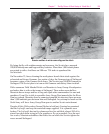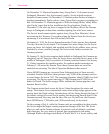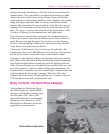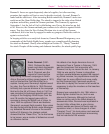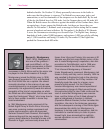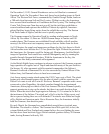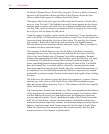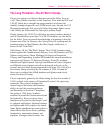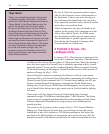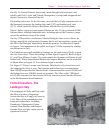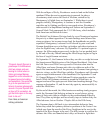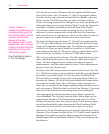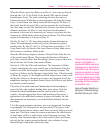
146
Close Combat
On March 9 Rommel leaves North Africa for good. On his way back to Germany
he meets with Mussolini in Rome and Hitler in East Prussia; despite his best
efforts, neither leader agrees to withdraw from North Africa.
Throughout March and early April, the Allies attack the Germans in North Africa
on every front. By April 7, the fight has irrevocably turned against the Axis forces,
and they begin to retreat. One week later, the Germans establish their final defen-
sive line. They make two massive air transport efforts to resupply the Axis troops,
but well over half the planes are shot down.
Using the support of artillery and air attacks, the American V Corps smashes into
what is left of the 15th Panzer Division and drives toward Tunis. Further north, the
Americans break through the Axis line in three places. The next day the German
line crumples. Before the Afrika Korps can concentrate, the Eighth Armored
Division slams into the retreating columns and panic ensues. There is no hope for
evacuation, and mass surrenders begin.
The campaign in North Africa is over. For the Allies, it has been a successful
campaign in many ways. Not only have they defeated the Axis forces in North
Africa, they have defeated one of Germany’s best field commanders, Rommel.
Perhaps more importantly, the Allies have learned a great deal that they will apply
in Normandy. The British have learned how to better coordinate infantry and
armor, something Rommel mastered before arriving in North Africa. The British
have also learned how to use their artillery effectively, massing batteries rather
than dispersing them along the front. Finally, they have realized the importance of
air superiority over the battlefield and beyond. British air superiority has contrib-
uted greatly toward preventing German reinforcements and supplies from reaching
the front.
The Allies have also learned a great deal about their opponents’ weapons. German
antitank guns took a heavy toll in North Africa, while Allied antitank weapons
often proved too light to stop many Panzers. This situation will still exist when the
Allies land in Normandy.
The Germans have learned some lessons, too. They were astonished at the richness
of the equipment they found abandoned by American troops. One German soldier
said that fighting the Soviets was man against man, but fighting the Americans
was man against machine. Clearly, the industrial might of the United States made
itself felt in North Africa; without American industry the British could not have
maintained numerical superiority in tanks. And American manpower helped tip the
balance; American troops faced German troops for the first time in North Africa.
While the Americans were inexperienced, they learned quickly
and they had
manpower reserves the Germans could not match.




